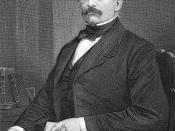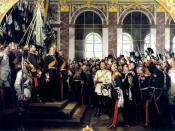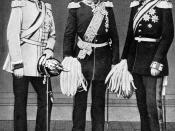A.) The Situation in 1862
When OTTO VON BISMARCK was appointed chancellor of Prussia by King Wilhelm IV. in 1862, the liberal democratic attempt to unify Germany had failed (1848/49). There was a widespread sentiment among the Germans, especially among the urban and protestant Germans, in favor of unification. Under similar conditions, COUNT CAMILLO CAVOUR had engineered Italy's unification in 1859/60. As in Italy's case, there were a number of obstacles to Germany's unification. Among them were foreign powers' interests in Germany:
Foreign Interests in Member Territories of the German Confederation, 1815-1870
Denmark The Netherlands Britain Holstein, Lauenburg (Duchies) Luxemburg (Duchy), Limburg (County) Hannover (on the British throne ruled the Hanover Dynasty)
Then, there was Austria, an Empire German by tradition and character (administration), but in which Germans accounted for only about 12 % of the population and which was a multinational state. The GREATER GERMAN SOLUTION would mean the dissolution of the Habsburg Empire and was out of the question.
So, the only option would be unification according to the SMALLER GERMAN SOLUTION, without the German territories held by Austria, under the leadership of Prussia. Still, Austria was against this model; Austria still held the presidency in the GERMAN CONFEDERATION, and many of the smaller state administrations, fearing Prussia's dominance, leant on Austria.
Then, Prussia, leading the unification, faced, to a lesser extent, Austria's dilemma. The Prussian provinces of Posen, West Prussia and East Prussia were not part of the German Federation, West Prussia and Posen having a Polish population majority. Other regions located outside of the German confederation, such as the Danish Duchy of SCHLESWIG, the French province of ALSACE and large parts of SWITZERLAND, had a German speaking majority.
B.) The Man
Otto von Bismarck was a nobleman, raised in the spirit of Prussian Bureaucracy, in loyalty...


